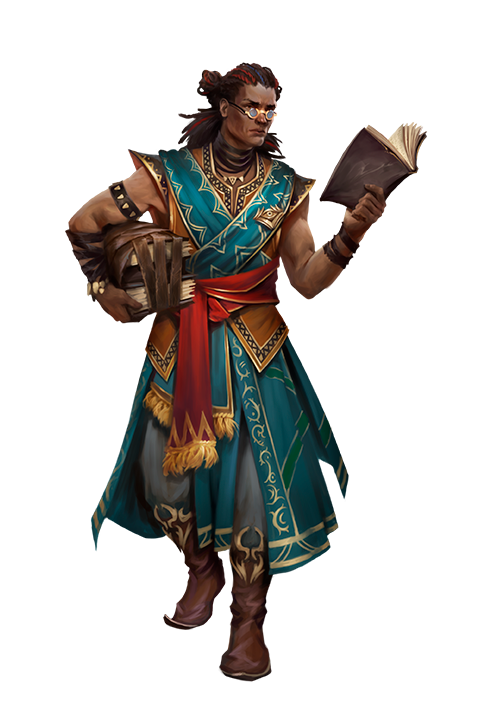Humans’ ambition, versatility, and exceptional potential have led to their status as the world’s predominant ancestry. Their empires and nations are vast, sprawling things, and their citizens carve names for themselves with the strength of their sword arms and the power of their spells. Humanity is diverse and tumultuous, running the gamut from nomadic to imperial, sinister to saintly. Many of them venture forth to explore, to map the expanse of the multiverse, to search for long-lost treasure, or to lead mighty armies to conquer their neighbors—for no better reason than because they can.
Physical Description
Humans' physical characteristics are as varied as the world's climes. Humans have a wide variety of skin and hair colors, body types, and facial features. Generally speaking, their skin has a darker hue the closer to the equator they or their ancestors lived.
Humans reach physical adulthood around the age of 15, though mental maturity occurs a few years later. A typical human can live to be around 90 years old. Humans often intermarry with people of other ancestries, giving rise to children who bear the traits of both parents. The most notable half-humans are half-elves and half-orcs.
Society
Humanity is perhaps the most heterogeneous of all the ancestries, with a capacity for great evil and boundless good. Some humans assemble into vast raging hordes, while others build sprawling cities. Considered as a whole, most humans are neutral, yet they tend to congregate into nations or communities of a shared alignment, or at least a shared tendency toward an alignment.
Human variety also manifests in terms of their governments, attitudes, and social norms. Though the oldest of human cultures can trace their shared histories thousands of years into the past, when compared to the societies of the elves or dwarves, human civilizations seem in a state of constant flux as empires fragment and new kingdoms subsume the old.
Religion
Humans also worship a wide range of gods and practice many different religions, tending to seek favor from any divine being they encounter.
Names
Unlike many ancestral cultures, which generally cleave to specific traditions and shared histories, humanity's diversity has resulted in a near-infinite set of names. The humans of northern tribes have different names than those dwelling in southern nation-states. Humans throughout much of the world speak Taldane (though some continents on Golarion have their own regional common languages), yet their names are as varied as their beliefs and appearances.
Sample Names
A variety of human ethnic groups—many of which have origins on distant lands— populates the continents bordering Golarion’s Inner Sea. Human characters can be any of these ethnicities, regardless of what lands they call home.
Human Mechanics
Traits
Human, Humanoid
Hit Points
8
Size
Medium
Speed
25 feet
Ability Boosts
Two free ability boosts
Languages
Taldane
Versatile Heritages | Human Feats
You select a heritage at 1st level to reflect abilities passed down to you from your ancestors or common among those of your ancestry in the environment where you were born or grew up. You have only one heritage and can’t change it later. A heritage is not the same as a culture or ethnicity, though some cultures or ethnicities might have more or fewer members from a particular heritage.
Skilled Heritage
Your ingenuity allows you to train in a wide variety of skills. You become
trained in one skill of your choice. At 5th level, you become an expert in
the chosen skill.
Versatile Heritage
Humanity's versatility and ambition have fueled its ascendance to be the
most common ancestry in most nations throughout the world. Select a general
feat of your choice for which you meet the prerequisites (as with your
ancestry feat, you can select this general feat at any point during
character creation).
Winter-touched Human
|
Uncommon
|
The power of winter flows through you. This heritage is most common among the Jadwiga of Irrisen, due to their descent from Baba Yaga, and certain Erutaki touched by the spirits. You gain cold resistance equal to half your level (minimum 1), and you treat environmental cold effects as if they were one step less extreme (incredible cold becomes extreme, extreme cold becomes severe, and so on).

No comments:
Post a Comment